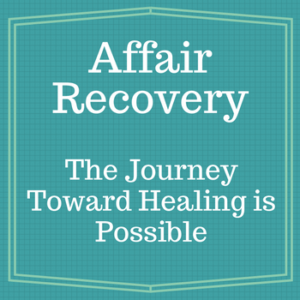Many of the couples I work with are trying to pick up the pieces and rebuild their marriage after an affair. The fallout from infidelity is considerable, challenging the couple to work through the distress caused by the affair while also learning how to discover new possibilities for trust, emotional safety and connection.
As one wife described:
“When I discovered Craig was having an affair my world was turned upside down. In that moment everything changed for me. It felt like I entered a nightmare I couldn’t wake up from.”
When the security of a relationship crumbles because of infidelity, it can feel like you are falling into a vortex of suffering. An emotional cocktail of depression, anger, confusion, panic and shock may consume you. At first, moments of calm may be elusive. This is because you’ve experienced the trauma of betrayal. A betrayal that has rocked you at your emotional core.
Affair Recovery Primer 
1) Finding your emotional footing
It’s important to note that you may feel emotionally hobbled, and while this can be debilitating, it is a normal reaction to a betrayal-trauma. Self-care is your priority. Balance is important. Processing your feelings about the affair while also finding ways to create momentary respites from your pain. This is easier said than done, since you may be flooded with feelings that appear to have a life of their own.
Seek support from family and friends if that will help. Listen to what your body is needing: Take naps, go for walks, zone out. It may be difficult to find the epicenter of calm within resurfacing pain, but you will in time.
2) The frustration of seeking answers
It is common to be bombarded by questions you ask yourself; at times painful questions:
- “Why didn’t you tell me you were unhappy?”;
- “How could you do this?”;
- “Who is s/he?”;
- “How long was this going on?”;
- “Do you love him/her?”
- “Are you still in contact with him/her?”
- “Did you do things with him/her that you and I have done?”
These are just some of the questions you might be flooded with. Some of these questions are pragmatic and answerable (“Are you still seeing him/her?”; “How long did you see him/her?”) and some aren’t (“Why did you do this?”).
It will be important to reflect upon why you are asking a particular question, since the answer (if the question is answerable) may make you feel worse. You might get pulled onto a hamster-wheel of questions that have no satisfying answers, especially the “Why did you do this?” question. During the early stages of healing, no answer is going to quiet your pain or magically explain what happened, and actually, the answers might temporarily take you away from the focus of self-care.
But of course you want the truth, you don’t want to live in an atmosphere of denial and secrecy.
At some point (later on) in the healing process, understanding why the affair occurred can help you and your spouse/partner rebuild a stronger marriage. It’s important to know what the vulnerabilities are in order to avoid further betrayals.
The vulnerabilities that exist may reside in the person who cheated (for instance, there are emotional issues from his/her childhood that were never dealt with that led to sexually acting out outside the marriage), or there may have been some unhealthy relationship dynamics that made being in the marriage painful. This, of course, isn’t meant to justify infidelity.
But at some point down the road, it will be necessary to look at the relationship in a truthful manner. You cannot gloss over underlying, difficult issues in the hope of moving past the pain.
3) Taking ownership
An important first step in the healing process is for the spouse/partner who had the affair to acknowledge his/her wrongdoing and the pain caused by his/her actions.
Taking ownership for the actions that have wounded the other has the potential to be a significant reparative event.
Reactions that get in the way of this step include denial (failure to take ownership), minimizing the other’s hurt (“It wasn’t that big of a deal”; “Can’t you get over it already?”), projecting blame (“If you weren’t so hard to deal with, I wouldn’t have cheated”). These reactions cause further emotional wounding and stall the potential for healing.
Taking ownership is a humbling experience that involves tolerating difficult emotions, the reality that you hurt someone you love, anger at yourself, and feelings of shame and embarrassment for acting in ways that violated your own values and ideals. Without the ability to experience and tolerate these intense feelings, you’re likely to move back into denial or projecting blame as a way to undo the distress that comes with taking ownership.
Taking ownership for your actions can also make you feel liberated and free from the debilitating effects of secrecy and self-denial. Self-healing (as well as relationship healing) can result from full ownership.
4) Finding structure to help process what happened
This is where marriage counseling (or couples counseling) can be very helpful. Many of the couples who come to see me tried to repair their marriage on their own after an affair. But the intensity of the pain got in the way, widening breakdowns in communication.
In short, their best intentions and efforts to move forward continuously stalled or deteriorated when the couple tried to talk about the affair.
The pain and emotional intensity need to be directed in such a way that meaningful processing can occur. The spouse/partner who cheated needs to learn how to remain emotionally present and listen to the deep pain and anger of the other. It is through empathic listening and engagement that healing can begin to take hold. The guidance of a marriage counselor who is experienced in working with post-affair dynamics can help you and your partner create healing dialogues that can create forward movement.
But even with this guidance, healing from an affair is seldom linear. Typically there is forward movement followed by backsliding. That is to be expected. Something new needs to be created between you (rather than trying to return to what was).
But for many couples, healing can and does occur. It takes perseverance, commitment and a plan. And many couples have reported that these efforts to rebuild have been well worth the effort.
Until next time,
Dr. Richard Nicastro
(Richard Nicastro, Ph.D., is a psychologist with over two decades of experience helping couples rebuild their marriage/relationship after an affair.)






